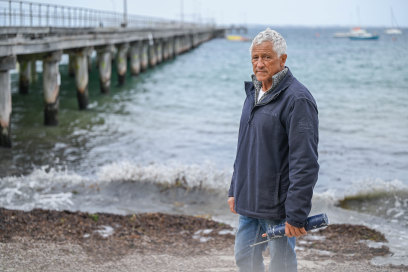Loading
The CPSU said these hubs would provide “education only”, not enforcement.
The Victorian Fisheries Authority has not made a formal announcement on the decision. In a statement, a spokesman confirmed “some workforce changes” had been proposed to redirect the agency’s focus to “education and engaging the community”.
A spokesman said the organisation was consulting workers and their union on the changes.
“Our workforce will focus on keeping compliance levels high, and on major fishing crime, while working closely with the community to provide them the education and resources they need to fish responsibly,” he said.
“We’re confident our new operating model means fishing in Victoria will be as good into the future as it is today.”
The internal staff briefing said there would be a greater focus on serious, organised fisheries crimes, with high levels of compliance reached with recreational fishers.
Recreational fishers have high levels of compliance, authorities say.Credit: Penny Stephens
“Victoria’s commercial fisheries have changed with a transition away from net fishing in most of our bays and inlets,” the briefing stated.
“Victoria’s fisheries are being maintained at record levels with all species harvested at sustainable levels.”
However, industry experts warn that without dedicated teams of fisheries officers with enforcement powers, illegal poachers could operate with impunity.
Dave Burgess, who worked for the authority for 47 years, said marine parks would be more exposed to poaching with fewer fisheries officers patrolling the waterways. “If the fisheries officers aren’t there, they will be raided overnight because they’re full of abalone and lobster.”

Kent Stannard at Flinders Pier.Credit: Joe Armao
Burgess, who retired in 2023, said fisheries officers were rostered at all hours and throughout the week to prevent illegal fishing and poaching.“You’ve got to be out there. You’ve got to be visible and a real deterrent,” he said. “Otherwise it gets out of hand.”
Fisheries officers conducted more than 8100 inspections in the three months to September 30, including 350 patrols in Victorian marine parks, detecting 702 offenders.
Loading
Donaldson said Victoria’s fisheries stocks were relatively abundant because of the dedicated work of generations of fisheries officers, who had performed a difficult and dangerous job. “There is a real risk that [fisheries] could become a product that organised crime gravitates towards,” he said.
Mornington Peninsula-based marine researcher Kent Stannard said cutting the ranks of fisheries officers could result in the extensive loss of vulnerable species.
“This could lead to an ecological disaster,” he said.
Stannard feared the decision might result in the overfishing of predators and prey species, which risked upsetting a delicate ecological balance in Victorian waters.
Stannard, who specialises in white sharks, said most anglers fished responsibly and obeyed bag limits. But he argued that poachers, who could fetch high prices for Australian seafood, would be emboldened by the authority’s decision to slash staff.
“Education is not going to stop people who are criminals,” he said. “It’s all driven by greed.”
A blacklip abalone.Credit: Wolter Peeters
Some Victorian seafood species are particularly prized on the international black market. Last month, the Victorian Fisheries Authority reported it had apprehended four men from outside the state who had allegedly taken more than 1000 blacklip abalone at Wingan Inlet near Mallacoota “in one of the largest illegal hauls” in the past 10 years.
The authority said the haul was worth an estimated $17,000 on the black market.
Loading
Stannard said wrasse, gummy shark, abalone and crayfish were among the species most at risk of overfishing because of their popularity in restaurants in Australia and overseas.
He said populations of tuna and kingfish were rebuilding in Victoria. “They would be prime targets for organised crime,” he said.
Community and Public Sector Union industrial organiser Kassey Dickie said the redundancies would result in remaining officers working alone more often, which would pose greater risks to their safety.
Dickie said fisheries officers had varied roles that included checking the compliance of commercial and recreational fishers with regulations, enforcement and prosecutions, and helping wildlife entangled in nets and fishing wire.
“This workforce is very passionate about what they do,” she said. “They’re well regarded in the fishing community.”
Loading
Donaldson – a former chief investigator at Fisheries Victoria, which formerly sat within the Department of Primary Industries – said the decision defied belief.
Over many years, Donaldson and his team had run controlled undercover operations, working hand in glove with state and federal police to catch illegal fishers in the act, he said.
“It took us many years to develop and access that legislation and those powers … [and] it became apparent to the crooks that it was time to pack up and go home,” he said.
The CPSU in a statement said 73 fisheries officer positions in Victoria would be cut and replaced with 36 fisheries engagement officers, who would be mostly focused on “community engagement”.
Start the day with a summary of the day’s most important and interesting stories, analysis and insights. Sign up for our Morning Edition newsletter.
Read the full article here


